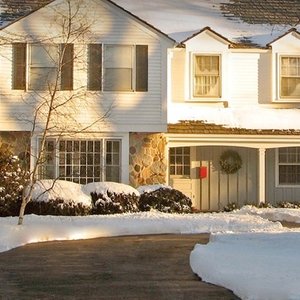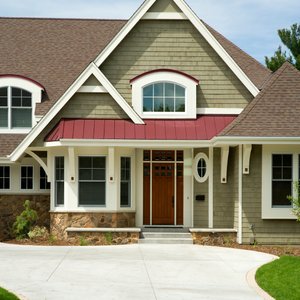Consumers Must Weigh Advantages of Asphalt and Concrete Driveways
published on september 11, 2013

Although the end of summer seems light years away from blistering winter winds, it's actually a good time to repair or replace driveways that get chipped away over several seasons.
When you replace a driveway or walking path, it's also a good time to install outdoor heating. Having radiant heat below those surfaces melts ice and snow away at the touch of an electric switch. In addition to having the areas cleared without backbreaking shoveling, driveway heating makes outdoor surfaces safe to walk and ride on by melting away slippery ice and snow.
But what to choose - concrete or asphalt? There are arguments for and against both these stalwarts of outdoor pavement, based on durability, cost and how long they normally last.
On one hand, concrete is virtually maintenance-free, is more durable and generally lasts longer than asphalt. But asphalt is less expensive so it's a popular choice when there's a large driveway to cover. However, some experts contend that asphalt will hold up as well as concrete if the installation is done correctly.
Asphalt Advantages
A worn-down asphalt driveway should be removed before a new one is installed, although some contractors will pave over old asphalt if the base is solid and hasn't any significant breaches. Usually, homeowners can expect to walk on a newly laid asphalt driveway in a day and drive on it after several days. If the job is done when the weather is cool, an asphalt surface will be usable more quickly.
No finish is needed, but contractors recommend that asphalt be resealed every 3 to 5 years.  Even with good maintenance, cracks will occur over time. When they do, there are many do-it-yourself products at home improvement stores that allow homeowners to make small repairs. However, when breaks are too large, they will be more difficult to repair and can be unsightly.
Even with good maintenance, cracks will occur over time. When they do, there are many do-it-yourself products at home improvement stores that allow homeowners to make small repairs. However, when breaks are too large, they will be more difficult to repair and can be unsightly.
Although asphalt is typically available only in one color - black - new tints have been introduced that can be added to a sealer to give homeowners some color variations.
Some special care may be needed for people who live in cold regions with lots of snow and ice. There is a freeze-and-thaw cycle that can cause frost heaves to "bubble" and raise the surface. But those sections can be dug out fairly easily and re-paved without removing the entire driveway. On the opposite end of the temperature spectrum, asphalt tends to soften and become tacky in very hot weather.
According to Great Day Improvements, a home improvement firm in Macedonia, Ohio, asphalt paving can cost between $2.50 to $4 per square foot. It varies depending on site conditions that may affect the project. Most asphalt surfaces will last 20 years or more.
Concrete Choices
For durability and longevity, concrete is the leader hands down. It's much more durable than asphalt and can last about 40 years, although cracking and frost heaves can occur in freezing temperatures. The downside is that when cracks occur, they are more difficult to repair than asphalt cracks.
Sealing is optional, although de-greasing of oil spots may be necessary periodically. The salt used for ice melting can create pits in concrete that leaves uneven blotches across the driveway. The Kansas State University Extension Service also warned consumers not to use de-icing agents because the chemicals they contain can eat away at concrete and cause cracks. Some, like calcium chloride, also leave a slippery, slimy residue behind on concrete surfaces. This issue presents another sound reason for installing driveway heating, as no harsh chemicals are needed to keep your driveway snow-free.
Concrete needs several days to "cure," compared to only a few hours for asphalt. A major difference between the two, however, is the adhesive ingredient in each surface. Asphalt's adhesive is tar while in concrete it is cement, a much stronger material.
There is also a wide selection of finishes and colors with concrete stains, allowing homeowners to have a surface that can enhance the home's curb appeal. Concrete can be stamped into different designs and etched to get a variety of looks. For a brick appearance without the much higher cost of bricks, there are less expensive faux bricks made from concrete pavers but finished with a brick-like surface, according to This Old House magazine.
Concrete can be stamped into different designs and etched to get a variety of looks. For a brick appearance without the much higher cost of bricks, there are less expensive faux bricks made from concrete pavers but finished with a brick-like surface, according to This Old House magazine.
While these factors add to concrete's value, it means the price of installation is higher. Great Day's estimate for a concrete driveway is $4 to $6 per square foot, not counting the added expense of finishes and designs, which can drive up the cost to $15 or more per square foot.
Final decision
The aesthetic appeal of a driveway surface is often a matter of personal taste. Some homeowners like the continuity of an asphalt driveway as it melds with the street pavement. Others are willing to spend the extra money for a stained concrete walkway or driveway that looks more sophisticated.
But climate, maintenance, cost and, sometimes, local building codes should be taken into consideration before a decision is made between asphalt and concrete.
Have Questions About Your Project?
Our team of Radiant Experts is ready to help!
Stay Updated
Get the latest radiant heating news and tips delivered to your inbox.



